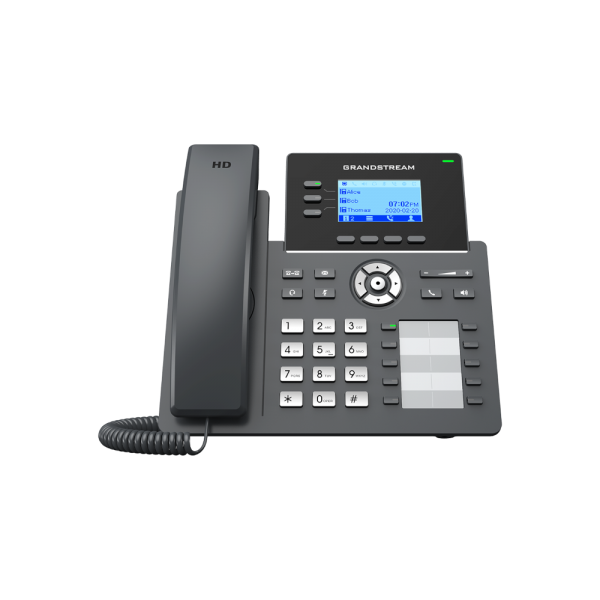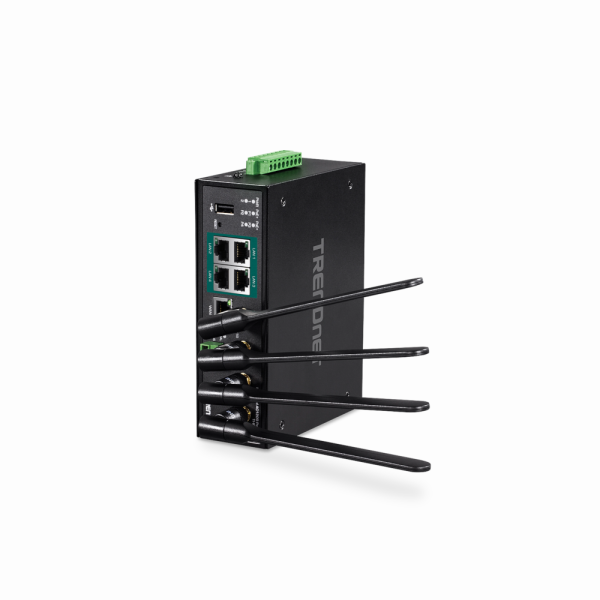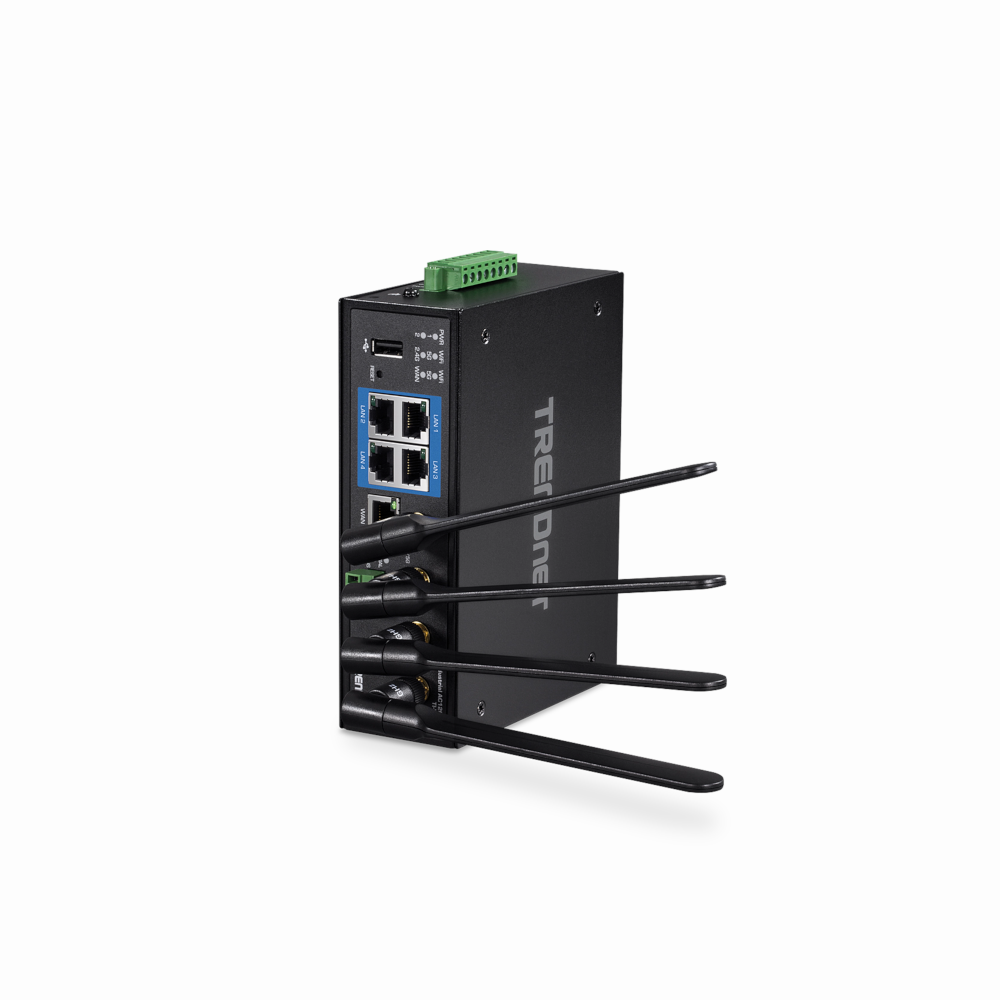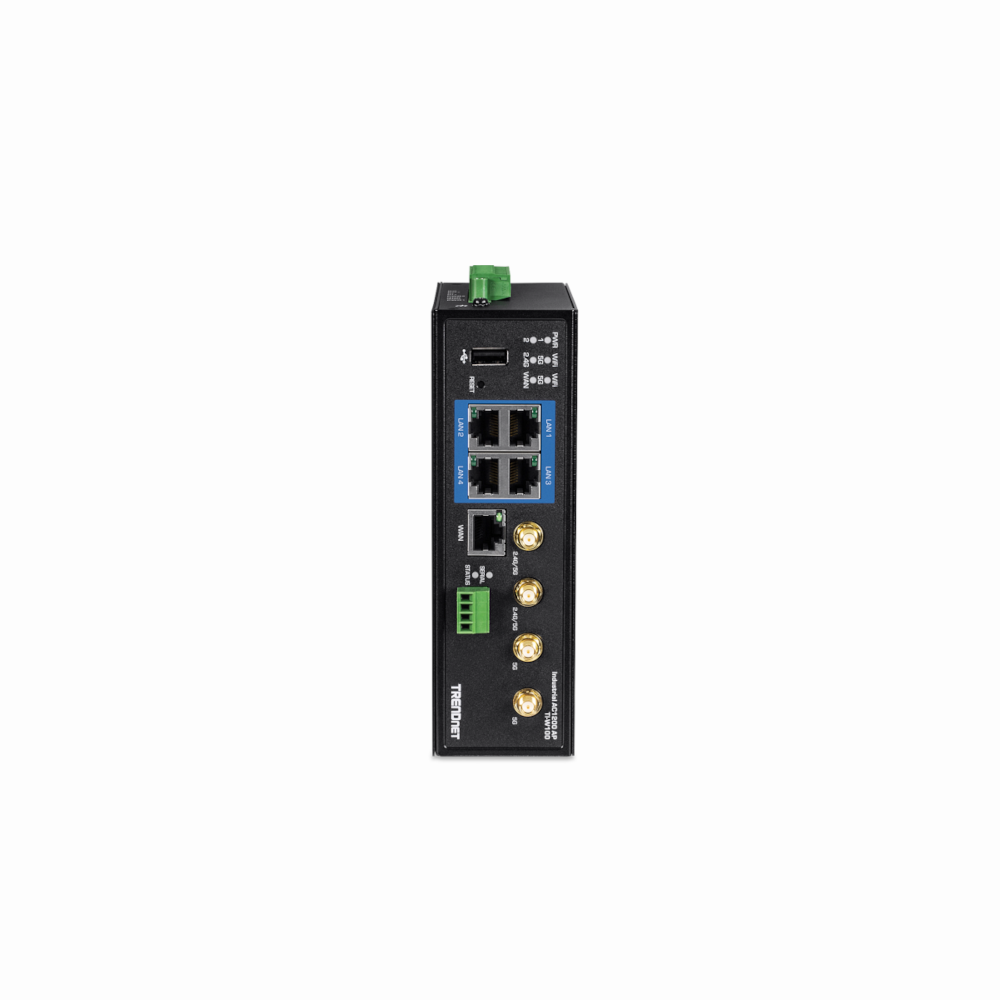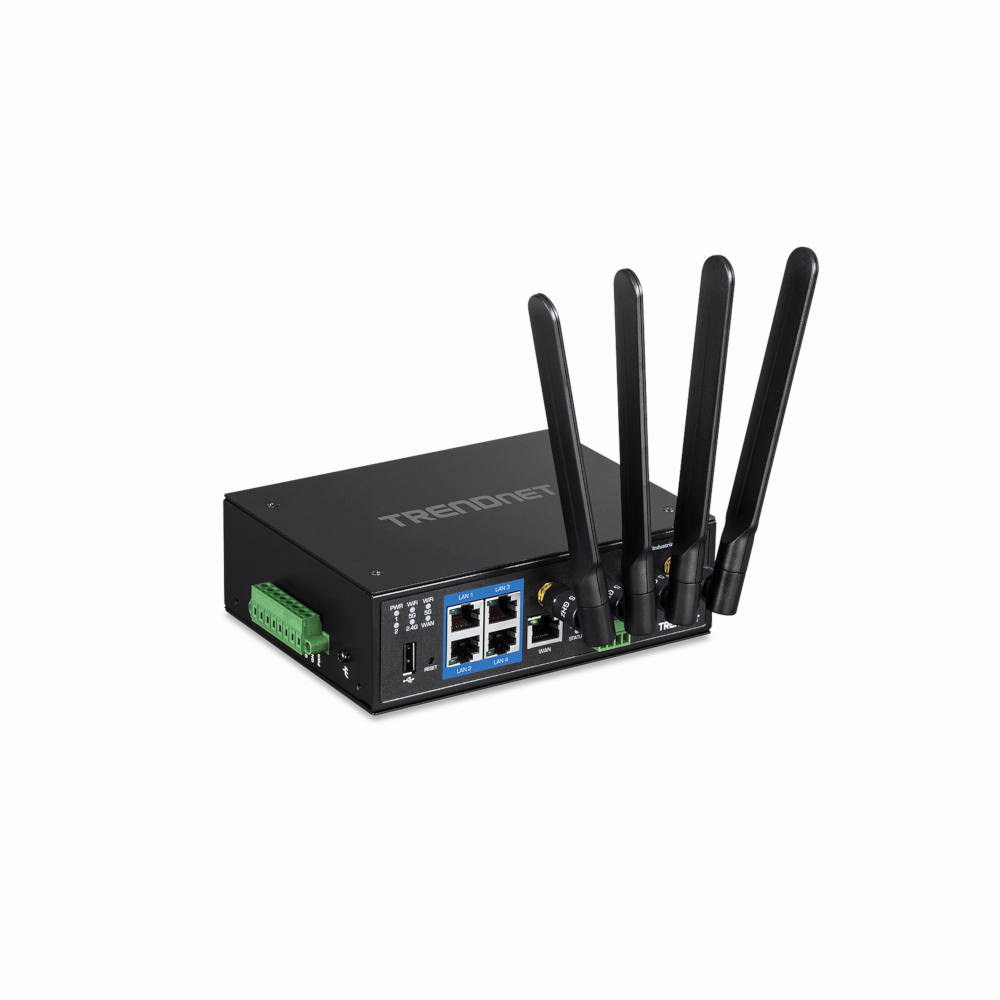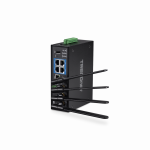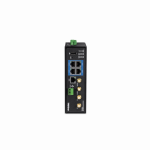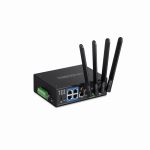Description
- Industrial AC1200 Dual-Band Wireless
- 4 x Gigabit ports, 1 x Gigabit WAN port
- Hardened IP30 rated metal housing
- Operating temperature range of -30° – 70° C (-22° – 158° F)*
- Up to 8 SSIDs per band
- SSID to VLAN mapping
- Wireless WAN support (WAN load balancing/failover between wired Ethernet WAN and Wireless WAN)
- 802.1Q/Port-based VLAN support
- Inter-VLAN routing
- IPsec & SSL VPN (OpenVPN) support
- Redundant power inputs with overload current protection
- Digital input/output
- Modbus serial port and virtual COM support
- Power supply sold separately (model: TI-M6024)
- Optional Magnetic WiFi Antenna base, model TEW-LB101 (sold separately)
| Specifications | |
| Standards | IEEE 802.3 |
| IEEE 802.3u | |
| IEEE 802.3x | |
| IEEE 802.3ab | |
| IEEE 802.1Q | |
| IEEE 802.1X | |
| IEEE 802.11a | |
| IEEE 802.11b | |
| IEEE 802.11g | |
| IEEE 802.11n (up to 300Mbps @ 256QAM)* | |
| IEEE 802.11ac (5GHz: up to 867Mbps @ 256QAM)* | |
| IEEE 802.3af | |
| IEEE 802.3at | |
| Device Interface | 4 x Gigabit ports |
| 1 x Gigabit WAN port | |
| 2 x Wireless WAN uplink (2.4GHz or 5GHz)* | |
| 1 x USB 2.0 (Log Storage) | |
| 4 x RP-SMA antenna connectors (2 x 2.4GHz/5GHz WLAN, 2 x 5GHz) | |
| 8-pin removable terminal block (primary/RPS power inputs & digital input/output) | |
| 4-pin removable terminal block RS-232/RS-485 serial port (Modbus) | |
| LED indicators | |
| Reset button | |
| Performance | NAT (LAN-to-WAN) throughput: 900Mbps |
| Routing performance: 900Mbps | |
| Maximum concurrent sessions: 32,000 | |
| Maximum number of VLANs: 4 (ID: 1-4091) | |
| IPsec VPN (AES-256/SHA-256/LAN-to-LAN) throughput: 160Mbps | |
| SSL VPN (OpenVPN®) Throughput (Blowfish/SHA-1/Server): 20Mbps | |
| VPN | SSL VPN Tunnels: Up to 2 |
| IPsec VPN Tunnels: Up to 16 tunnels | |
| SSL OpenVPN Modes: Server, Client | |
| SSL OpenVPN Encryption: Blowfish, AES-128/192/256 | |
| SSL OpenVPN Authorization: TLS with RSA, Static Key | |
| SSL OpenVPN Hash Algorithm: MD4, MD5, SHA-1/256/512 | |
| IPsec VPN Modes: Site-to-Site, Client-to-Site or Dynamic VPN | |
| IPsec Encryption: DES, 3DES, AES-128/192/256 | |
| IPsec Hash Algorithm: MD5, SHA-1/256 | |
| IPsec Key Exchange: IKEv1/2, Main/Aggressive Mode, Pre-shared key, X.509, DH Groups 1/2/5/14-18 | |
| IPsec Protocols: ESP/AH, PFS DH Groups 1/2/5/14-18, X-AUTH, DPD, Local/Remote ID: FQDN, User@FQDN, Key ID | |
| IPsec NAT Traversal | |
| Networking | WAN Modes: NAT, Classical Routing or Bridge Mode (NAT Disabled) |
| NAT Loopback Enable/Disable | |
| NAT Modes: NAT, PAT, One-to-One NAT | |
| VLAN tag assignment on WAN interface | |
| IPv4 WAN Modes: Dynamic IP (DHCP), Static IP, PPPoE, PPTP, L2TP | |
| Wireless WAN Mode: NAT enable/disable, Dynamic IP (DHCP), Static IP, fast roaming signal threshold/channels | |
| IPv6 WAN Modes: Static, Auto-configuration (SLAAC/DHCPv6), Link-Local, PPPoE | |
| VLAN ID assignment on WAN interface | |
| IGMP proxy on WAN interface | |
| WAN IP address alias | |
| Routing: Static (Up to 64 entries), RIPv1/v2, OSPFv2, BGP4 | |
| Static ARP (Up to 32 entries) | |
| VLAN: Port-based, 802.1Q (Up to 4 VLANs, 4 IP interfaces) | |
| Inter-VLAN Routing | |
| SSID per VLAN assignment | |
| DHCP Server, Relay, Options 42/66/72/114/150/160 | |
| Dynamic DNS: dyn.com, no-ip.com | |
| WAN Failover | |
| Networking monitoring for WAN load balancing (DNS query or ICMP, latency threshold, fail threshold, query threshold) | |
| WAN Traffic load balancing: Smart Weight (Automatic), Specific Weight Percentage, User defined traffic policy | |
| VPN passthrough: IPsec, PPTP, L2TP | |
| Up to 8 SSIDs per band | |
| AP Router, WDS only, and WDS hybrid modes | |
| WiFi scheduling | |
| 5G WiFi bandsteering | |
| Access Control | Wireless encryption: WPA/WPA2-PSK, WPA/WPA2-RADIUS |
| Wireless IDS | |
| Certificate management (Root CA, SCEP, Local certificate, self-signed, RSA, Import PEM certificates) | |
| NAT/SPI, virtual server/port forwarding, port triggering, firewall traffic rules, DMZ host, allow/deny ping on WAN interfaces | |
| ALG: PPTP/L2TP/IPsec VPN passthrough | |
| MAC filtering | |
| Custom scheduling for access control rules | |
| MMI (max. password attempts, login timeout, HTTP/HTTPS, HTTPS certificate, HTTP compares/binding) | |
| Wireless client isolation | |
| Stealth Mode | |
| DoS prevention | |
| Quality of Service | Software-based priority queues |
| Hardware-based bandwidth control | |
| WMM | |
| Management | HTTP/HTTPS web-based GUI |
| CLI: Telnet / SSHv2 | |
| Command script | |
| TR-069/STUN | |
| SNMP v1, v2c, v3 | |
| SNMP trap (up to 4 receivers) | |
| Modbus Slave, gateway for TCP, and RTU/ASCII master/slave access | |
| Virtual COM RFC2217, TCP client, TCP server, UDP | |
| Data logging (sniffer, offline proxy, full-time proxy) | |
| Device configuration backup & restore, upgrade firmware, reboot, and reset to default | |
| Scheduled auto reboot | |
| Auto restore configuration | |
| Set custom UI logo | |
| Set custom CSS | |
| Wake-on-LAN (WoL) | |
| Diagnostic tools: Built-in ping, traceroute, speed test, and packet capture utilities | |
| Event configuration and management: digital input/output, Modbus, syslog, SNMP trap, email alert, reboot | |
| System time settings (NTP, manually set, or copy from PC, time zone, and daylight savings time) | |
| FTP/FTPS/SFTP server | |
| Creates groups (IP, MAC, or host name), external server object definition | |
| MIB | MIB II RFC 1213 |
| Frequency | 2.412 – 2.462GHz |
| 5.150 – 5.250GHz, 5.725 – 5.850GHz | |
| Modulation | 802.11b: CCK, DQPSK, DBPSK |
| 802.11a/g: OFDM with BPSK, QPSK and 16/64-QAM | |
| 802.11n: BPSK, QPSK, 16-QAM, 64-QAM, 256-QAM with OFDM | |
| 802.11ac: OFDM with BPSK, QPSK and 16/64/256-QAM | |
| Media Access Protocol | CSMA/CA with ACK |
| Antenna Gain | 4 x 2.4GHz 2.5dBi / 5GHz: 3.5 dBi dual-band detachable/external |
| Wireless Output Power (max output power without antenna gain) |
802.11a: FCC: 21 dBm (max.) / ETSI: 17.38 dBm (max.) |
| 802.11b: FCC: 26 dBm (max.) / ETSI: 17.38 dBm (max.) | |
| 802.11g: FCC: 23 dBm (max.) / ETSI: 17.38 dBm (max.) | |
| 802.11n (2.4GHz): FCC: 21 dBm (max.) / ETSI: 14.38 dBm (max.) | |
| 802.11n (5GHz): FCC: 21 dBm (max.) / ETSI: 16.4 dBm (max.) | |
| 802.11ac: FCC: 21 dBm (max.) / ETSI: 16.4 dBm (max.) | |
| Receiving Sensitivity | 802.11a: -68 dBm (typical) @ 54Mbps |
| 802.11b: -83 dBm (typical) @ 11Mbps | |
| 802.11g: -70 dBm (typical) @ 54Mbps | |
| 802.11n (2.4GHz): -66 dBm (typical) @ 300Mbps | |
| 802.11n (5GHz): -64 dBm (typical) @ 300Mbps | |
| 802.11ac: -55 dBm (typical) @ 867Mbps | |
| Wireless Channels | 2.4GHz: FCC: 1 – 11, ETSI: 1 – 13 |
| 5 GHz: FCC: 36, 40, 44, 48, 149, 153, 157, 161, 165; ETSI: 36, 40, 44, 48 | |
| Power | PWR (Primary) terminal input: 24 – 56V DC |
| RPS (Redundant) terminal input: 24 – 56V DC | |
| Digital Input: Logic 0: 0V-2V, Logic 1: 5V-30V | |
| Digital Output: Relay Mode, up to 30V/1A | |
| Compatible power supply: TI-M6024 (60W) sold separately | |
| Max. Consumption: 20W | |
| Terminal Block | Redundant power inputs, alarm relay contact, 8 pin |
| Solid wire (AWG): 12-24 | |
| Stranded wire (AWG): 12-24 | |
| Wire strip length: 5mm | |
| Enclosure | IP30 rated metal enclosure |
| Fanless passive cooling | |
| DIN-Rail mount | |
| Grounding point | |
| ESD (Ethernet) Protection: 8KV DC | |
| Surge (Power) Protection: 2KV DC | |
| MTBF | 414,021 hours @ 25° C |
| 285,605 hours @ 70° C | |
| Operating Temperature | -30° – 70° C (-22° – 158° F)* |
| Operating Humidity | Max. 95% non-condensing |
| Dimensions | 160 x 120 x 51mm (6.3 x 4.72 x 2.01 in.) |
| Weight | 884g (1.95 lbs.) |
| Certifications | CE |
| FCC | |
| Freefall (IEC 60068-2-32) | |


